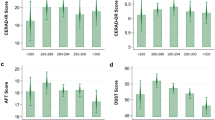Abstract
Objectives
Prior studies have suggested a relationship between dehydration and poor cognitive performance. The present study examined the relationships among hydration status, declarative memory and working memory skills, and blood pressure in a sample of older community dwelling females.
Design
Data was analyzed from a larger study; relationships among hydration status, blood pressure, and cognitive measures were assessed with correlation and meditational analyses.
Setting
Laboratory.
Participants
21 postmenopausal women (mean age 60.3, SD 8.03).
Measures
Hydration status was measured using bioelectrical impedance, baseline blood pressure was assessed using a Colin Pressmate, and cognition was examined using the Auditory Verbal Learning Test and Auditory Consonant Trigrams.
Results
Bioelectrical impedance total body water by weight was found to be related to working memory, r =.47, p =.04, and memory skills, r =.54, p =.01. Total body water by weight was also found to be related to diastolic blood pressure, r = −.56, p =.01, which in turn was related to working memory, r = −.67, p =.002, and declarative memory, r = −.57, p =.009, skills. When diastolic blood pressure was accounted for, the relationship between hydration status and cognitive skills was attenuated. A similar pattern of results was seen for systolic blood pressure, although findings did not reach statistical significance.
Conclusions
Results emphasize the importance of considering hydration status and blood pressure when interpreting cognitive performance in older adults.
Similar content being viewed by others
References
Kleiner SM. Water: An essential but overlooked nutrient. J Am Diet Assoc 1999;99:200–206.
Pierson RN, Wang J, Thornton JC, Heymsfield SB. The quality of the body cell mass — 1996. Are we ready to measure it? Appl Radiat Isot 1998;49:429–435.
Food and Nutrition Board. Recommended Dietary Allowances. 9th ed. Washington DC: National Academy Press; 1980.
Kant AK, Graubard BI, Atchison EA. Intakes of plain water, moisture in foods and beverages, and total water in the adult US population-nutritional, meal pattern, and body weight correlates: National Health and Nutrition Examination Surveys 1999–2006 Am J Clin Nutr 2009;90:655–663.
Ritz P. Chronic cellular dehydration in the aged patient. J Gerontol A Biol Sci Med Sci 2004;56a:M349–M352.
Kenny WL, Chui P. Influence of age on thirst and fluid intake: Med Sci Sports Exerc 2001;33:1524–1532.
Greenleaf JE. Problem: thirst, drinking behavior, and involuntary dehydration. Med Sci Sports Exerc 1992;24:645–656.
Weinberg AD, Minaker KL. Dehydration: Evaluation and management in older adults. JAMA 1995;274:1552–1556.
Borra SI, Beredo R, Kleinfeld M. Hypernatremia in the aging: Causes, manifestations and outcome. J Nal Med Assoc 1995;87:220–224.
Bennett JA, Thomas V, Riegel B. Unrecognized chronic dehydration in older adults: examining prevalence rates and risk factors. J Gerontol Nurs 2004;30:210–225.
Arief AI. Central nervous system manifestations of disordered sodium metabolism. Clin Endocrinol Metab 1984;13:269–294.
Inouye SK. Prevention of delirium in hospitalized older patients: Risk factors and targeted intervention strategies. Ann Med 2000;32:257–263.
Cian C, Koulmann N, Barraud PA, Raphel C, Jimenez C, Melin B. Influence of variations in body hydration on cognitive function: Effect of hyperhydration, heat stress and exercise-induced dehydration. J Psychophysiol 2000;14:29–36.
Gopinathan PM, Pichan G, Sharma VM. Role of dehydration in head stress-induced variations in mental performance. Arch Environ Health 1988;43:15–17.
Sharma VM, Sridharan K, Pichan G, Panwar MR. Influence of heat-stress induced dehydration on mental functions. Ergonomics 1986;29:791–799.
Suhr JA, Hall J, Patterson S, Tong Niinistro R. The relation of hydration status to cognitive performance in healthy older adults. Int J Psychophysiol 2004;53:121–125.
Waldstein SR, Brown JRP, Maier KJ, Katzel LI. Diagnosis of hypertension and high blood pressure levels negatively affect cognitive function in older adults. Ann Behav Med 2007;29:174–180.
Madden DJ, Blumenthal JA. Interaction of hypertension and age in visual selection attention performance. Health Psychol 1998;17:76–83.
Waldstein SR, Katzel LI. Hypertension and cognitive function. In Waldstein SR, Elias MF (eds.). Neuropsychology of cardiovascular disease. Mahwah, NJ: Lawrence Erlbaum; 2004.
Patterson SM, France CR, Prause LM, Gill M. Hydration status and cardiovascular psychophysiology. Psychophysiology 2002;39:S34.
Patterson SM, Rochette LM, France CR, France JL, Rader A. Effects of predonation water loading on self report and actual vasovagal reactions in novice blood donors. Psychosom Med 2006;68:A39.
Spigt MG, Knottnerus JA, Westerterp KR, Olde Rikkert MGM, van Schayck CP. The effects of 6 months of increased water intake on blood sodium, glomerular filtration rate, blood pressure, and quality of life in elderly (aged 55–75) men. JAGS 2006;S4:438–443.
Suhr J, Demireva P, Heffner K. The relation of salivary cortisol to patterns of performance on a word list learning task in healthy older adults. Psychoneuroendocrinology 2008;33:1293–1296.
Brodie D, Moscrip V, Hutcheon R. Body composition measurement: a review of hydrodensitometry, anthropometry, and impedance methods. Nutrition 1998;14:296–310.
Armstrong LE, Kenefick RW, Castellani JW, Riebe D, Kavouras SA, Kuznicki JT, Maresh CM. Bioimpedance spectroscopy technique: intra-, extracellular, and total body water. Med Sci Sports Exer 1997;29:1657–1663.
Shanholtzer BA, Patterson SM. Fluid Hydration Status Assessment in Behavioral Medicine Research: Seven-Day Test-Retest Reliability, Ann Behav Med 2002;45:S134.
Strauss E, Sherman EMS, Spreen O. A compendium of neuropsychological tests: Administration, norms, and commentary. 3rd ed. New York: Oxford University Press; 2006.
Baron RM, Kenny DA. The moderator-mediator variable distinction in social psychological research: Conceptual, strategic, and statistical considerations. J Pers Soc Psychol 1986;51:1173–1182.
MacKinnon DP, Warsi G, Dwyer JH. A simulation study of mediated effect measures. Multivariate Behav Res 1995;30:41–62.
Shirreffs SM. Markers of hydration status. J Sports Med Phys Fitness 2000;40:80–84.
Author information
Authors and Affiliations
Corresponding author
Rights and permissions
About this article
Cite this article
Suhr, J.A., Patterson, S.M., Austin, A.W. et al. The relation of hydration status to declarative memory and working memory in older adults. J Nutr Health Aging 14, 840–843 (2010). https://doi.org/10.1007/s12603-010-0108-8
Received:
Accepted:
Published:
Issue Date:
DOI: https://doi.org/10.1007/s12603-010-0108-8




